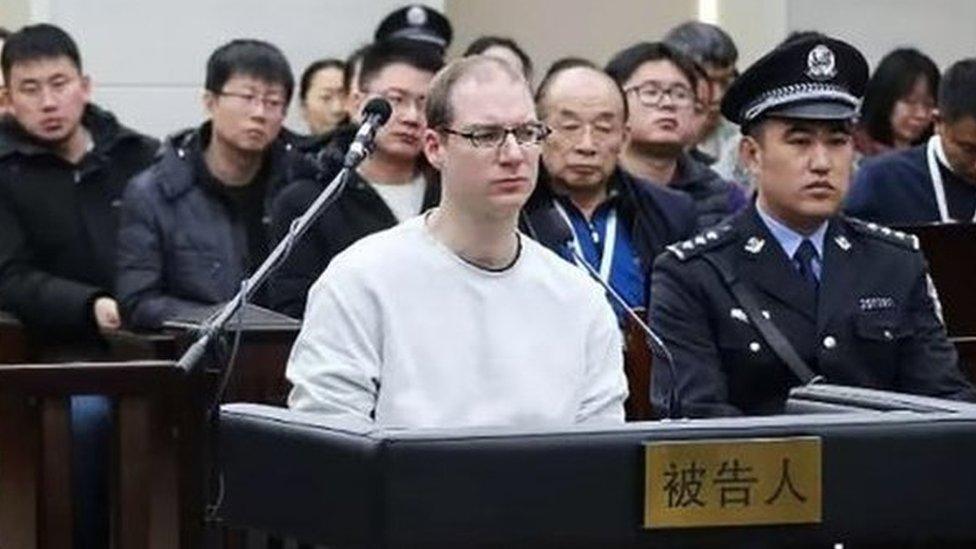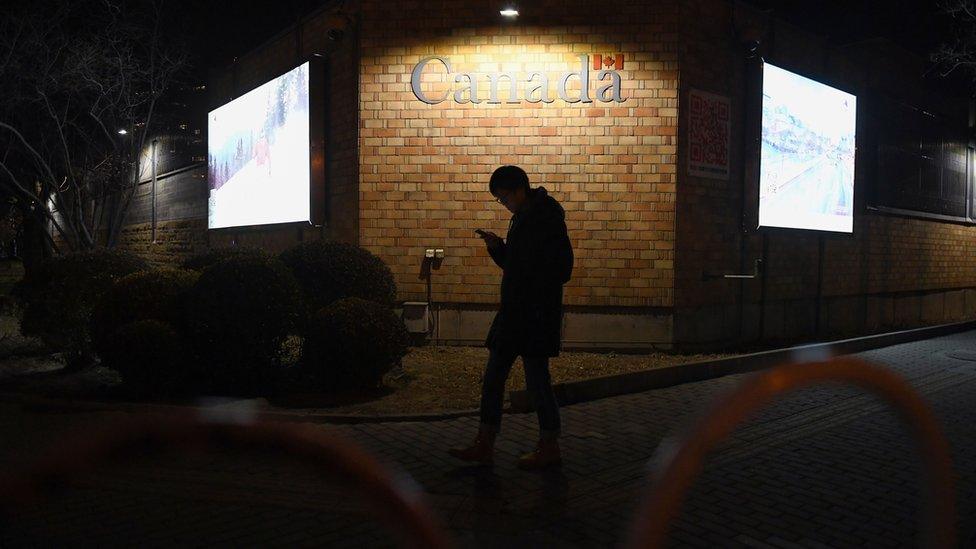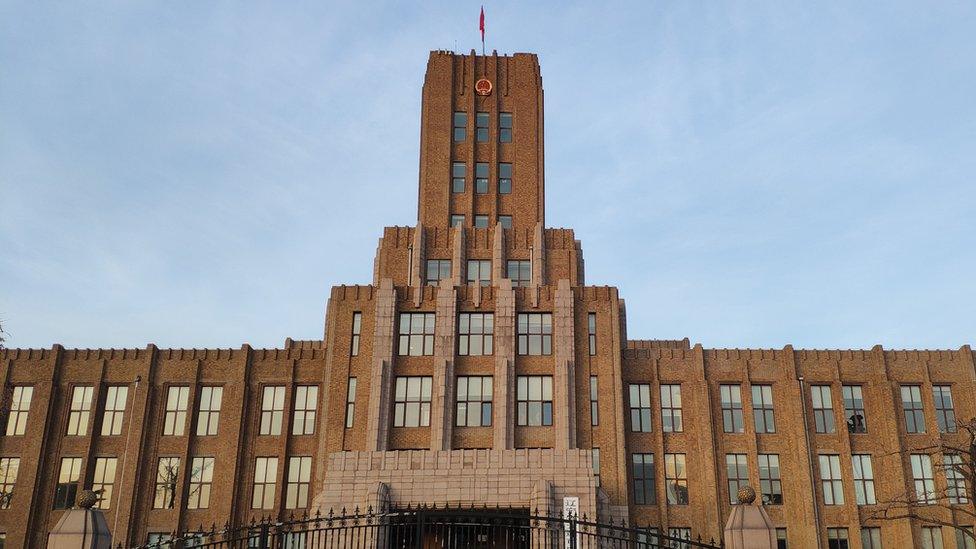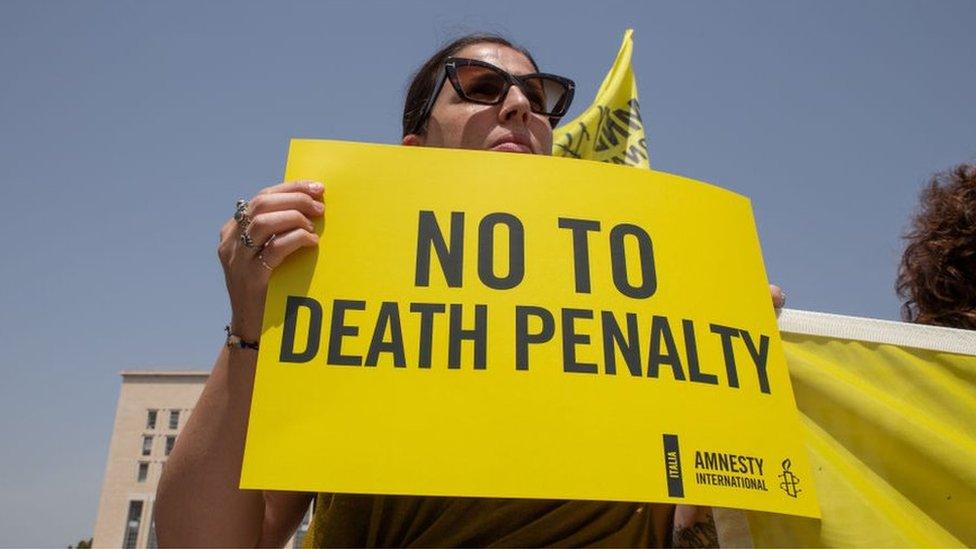Robert Schellenberg: What we know about his case so far
- Published

Robert Lloyd Schellenberg was sentenced to jail last year but had his case suddenly reviewed
A court in China has sentenced a Canadian citizen to death for drug smuggling amid rising diplomatic tensions between the two countries.
The court said Robert Lloyd Schellenberg's 15-year jail term, received in November, was too lenient.
Canadian Prime Minister Justin Trudeau has since accused China of arbitrarily applying the death penalty.
China said that Canada should respect its sovereignty. Schellenberg now has 10 days to launch an appeal.
Who is Robert Schellenberg?
Schellenberg, who is believed to be 36, is a native of Abbotsford, British Columbia.
Details of his early life are unclear. According to British Columbia's online court database, external, he was convicted 11 times for drug and impaired-driving offences between 2003-2012 and served two jail terms.
In 2010, Schellenberg was sentenced to one year in prison and two years' probation for three counts of drug possession "for the purpose of trafficking."
Shortly afterwards, in 2012, he was convicted of four more drugs-related offences and sentenced to two years in jail, though he only spent 16 months behind bars.
According to CBC News, external, at Schellenberg's sentencing he was told by Justice Neil Brown: "Your country deserves much better from you. You are in one of the best places in the world to live."
Mr Brown said Schellenberg was struggling with addiction.
"He had a work-related accident in which he injured his femur," Mr Brown told CBC.
"At the time of his arrest, indeed, he was wearing a cast, and apparently because of his injury, was abusing pain medications."
Mr Brown added that Schellenberg's father "had turned his back on him because of his criminal history, although he still has the support of some family members".
It is unclear what he did between his release from prison - set for mid-2013 - and his involvement in the Chinese drug case.
In an interview with the New York Times, external, Schellenberg's aunt, Lauri Nelson-Jones, described him as "an adventurous traveller who used earnings from working in Alberta's oil fields to pay for his travels in Asia".
"He called and told his dad - my brother - that he was heading off to China, and it was just like, 'ok, whatever,'" Ms Nelson-Jones said.
Schellenberg was arrested by Chinese authorities in 2014.

Canada-born Schellenberg says he had been visiting China as a tourist before his arrest
Why was he arrested in China?
Prosecutors allege that Schellenberg tried to smuggle almost 500lb (227kg) of methamphetamine from Dalian, in northern China, to Australia, using plastic pellets hidden in rubber tyres.
The alleged operation fell apart after an accomplice, Xu Qing, reported it to Chinese authorities.
Schellenberg was later arrested in Guangzhou, southern China, after allegedly trying to escape to Thailand.
He was detained for 15 months before his first trial. In December 2018, he was convicted of drug smuggling and handed a 15-year jail sentence, along with a 150,000 yuan (US$22,000) fine.
The Wall Street Journal - one of the few non-Chinese media outlets invited to cover the trial - said some of Schellenberg's statements were mistranslated, external. His defence lawyer interjected to correct translations on two occasions. In one instance, Schellenberg told the court that he did not know about any drugs, but the translator said that he did not know where the drugs were.
Two other Chinese men were sentenced in the case - one was given life imprisonment, while another was handed a suspended death sentence.

The court in north-eastern China where Schellenberg's case was reviewed
What does he say?
Schellenberg has denied all charges against him and says he has been framed.
According to AFP news agency, he told the court that he came to China as a tourist after travelling through Southeast Asia.
Schellenberg said he initially met Mr Xu for help with translation, but later became unwittingly involved with him in international drug trafficking.
He appealed against the 15-year jail sentence and was re-tried in Dalian on Monday.
At his hearing, judges ruled that his previous sentence had been too light and that evidence proved he was more seriously involved in international drug smuggling.
Zhang Dongshuo, Schellenberg's lawyer, told Reuters that the sentence should not have been increased because no new evidence was presented at the trial.
- Published16 January 2019

- Published11 December 2018

- Published25 January 2024
